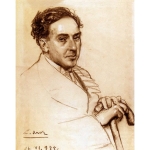Crash on crash of the sea,
straining to wreck men; sea-boards, continents,
raging against the world, furious,
stay at last, for against your fury
and your mad fight,
the line of heroes stands, godlike:
Akroneos, Oknolos, Elatreus,
helm-of-boat, loosener-of-helm, dweller-by-sea,
Nauteus, sea-man,
Prumneos, stern-of-ship,
Agchilalos, sea-girt,
Elatreus, oar-shaft:
lover-of-the-sea, lover-of-the-sea-ebb,
lover-of-the-swift-sea,
Ponteus, Proreus, Oöos:
Anabesneos, who breaks to anger
as a wave to froth:
Amphiolos, one caught between
wave-shock and wave-shock:
Eurualos, board sea-wrack,
like Ares, man’s death,
and Naubolidos, best in shape,
of all first in size:
Phaekous, sea’s thunderbolt—
ah, crash on crash of great names—
man-tamer, man’s-help, perfect Laodamos:
and last the sons of great Alkinöos,
Laodamos, Halios, and god-like Clytomeos.
Of all nations, of all cities,
of all continents,
she is favoured above the rest,
for she gives men as great as the sea,
to battle against the elements and evil:
greater even than the sea,
they live beyond wrack and death of cities,
and each god-like name spoken
is as a shrine in a godless place.
But to name you,
we, reverent, are breathless,
weak with pain and old loss,
and exile and despair—
our hearts break but to speak
your name, Oknaleos—
and may we but call you in the feverish wrack
of our storm-strewn beach, Eretmeos,
our hurt is quiet and our hearts tamed,
as the sea may yet be tamed,
and we vow to float great ships,
named for each hero,
and oar-blades, cut of mountain-trees
as such men might have shaped:
Eretmeos, and the sea is swept,
baffled by the lordly shape,
Akroneos has pines for his ship’s keel;
to love, to mate the sea?
Ah there is Ponteos,
the very deep roar,
hailing you dear—
they clamour to Ponteos,
and to Proëos
leap, swift to kiss, to curl, to creep,
lover to mistress.
What wave, what love, what foam,
For Oöos who moves swift as the sea?
Ah stay, my heart, the weight
of lovers, of loneliness
drowns me,
alas that their very names
so press to break my heart
with heart-sick weariness,
what would they be,
the very gods,
rearing their mighty length
beside the unharvested sea?



















Comment form: